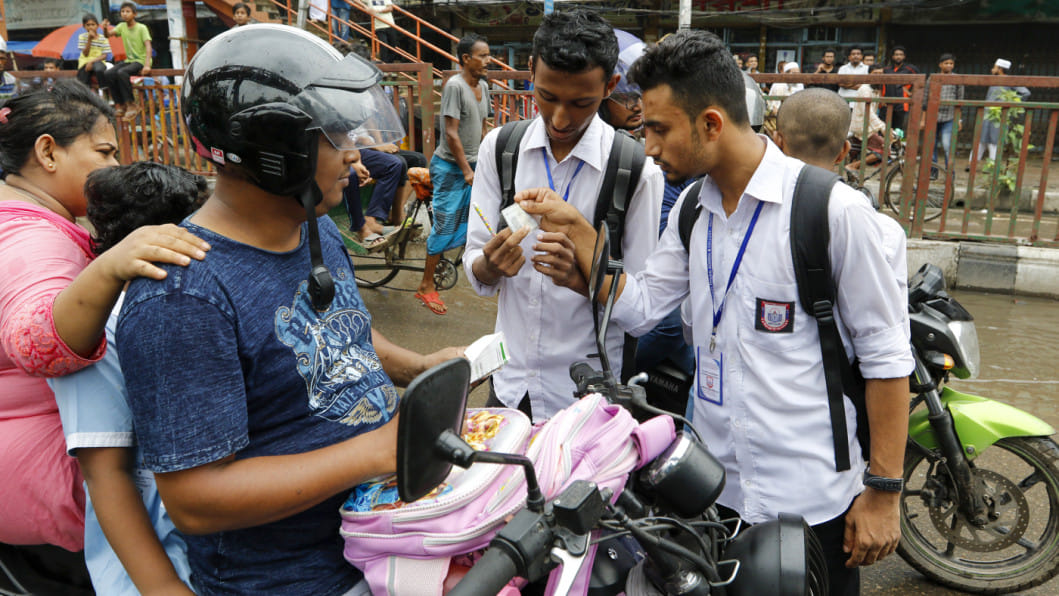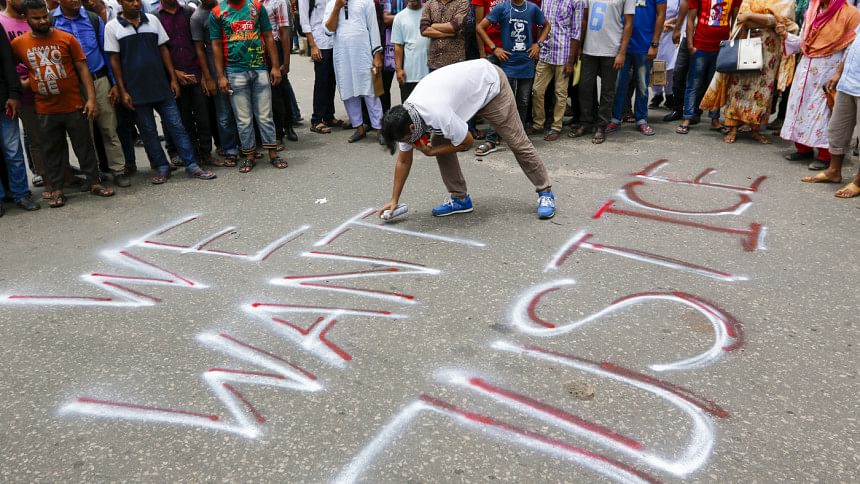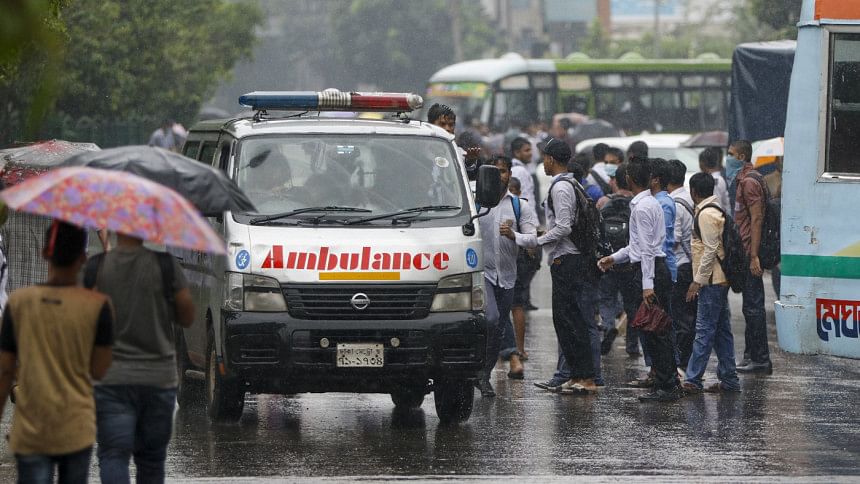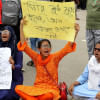Road Safety in Bangladesh: Demanded, yet Undelivered

Between July 28 and August 4, 2018, there was something different about Dhaka. Major roads were seen with reserved lanes, for emergency vehicles and for rickshaws, while motor vehicles were reduced to a crawl. Motorists were required to produce licence and registration to those who governed the streets.
Uniformed, disciplined, and determined – the individuals who were overseeing the road safety in Dhaka were not policemen. They were neither soldiers nor volunteers. The roads during that week belonged to students, schoolchildren who had lost two of their own to the lawless streets, young individuals who demanded change and wanted it then and there.
On this week, four years ago, school and college students across the country protested to ensure road safety for all. Suffice to say, the roads are still unsafe. During this year's Eid-ul-Azha holidays, more deaths resulting from road accidents have been recorded than ever before.
In broad terms, the Road Safety Movement of 2018 failed, but what significance does it hold to those whose willpower turned these protests into a national phenomenon? How do they remember it? Four years on, what do they think they were able to achieve, if anything?
Samiha Medha was a student of class 10 in Viqarunnisa Noon School in 2018. She remembers coming home and finding out from the news that Dia Khanom Mim and Abdul Karim Rajib, students of Shaheed Ramiz Uddin School and College, were run down by a bus of Jabal-e-Noor Paribahan.
"Rage – that was the first reaction," recalled Medha. "On that first day, there were calls for protests on social media. Some of my schoolmates took initiative, created an event page on Facebook, organised protests, and decided to demonstrate in Shantinagar."
This spontaneity, fuelled by intense fury at the horrors that befell Diya and Rajib, spread the protests citywide.
"We were sitting for exams when the news broke, and we saw juniors from our college going out onto the streets," said Shamsul Abedin Anik, a class 12 student at Dhaka City College at that time. "Eventually, my classmates and I got out on the streets as well. All the colleges in our area – Dhaka City College, Dhaka College, and Ideal College – protested together, which was quite unprecedented."

This flame, kindled in Dhaka, soon spread all over the country.
"I felt a change was the need of the hour. So, when students started to protest in Khulna, I joined them," shared Khandakar Humyra Oyshi, who, in 2018, was a student of Govt. Majeed Memorial City College, Khulna.
While anger and frustration played major roles, road safety is an issue that's pertinent to the lives of all, and many took to the roads with self-preservation in their minds.
"I used to commute by bus from my home in Banasree to my college in Mohammadpur. I knew the roads were a constant death trap for many of us, so I had to take to the streets for my own sake," said Apon Biswas, who studied at Dhaka Residential Model College.
So, what did these schoolchildren-turned-protesters want?
Beyond the chants of "We want justice!" that rang out all over the country, sincere implementation of existing traffic laws and necessary reforms were the crux of the demands put forth by students.
"We wanted the existing traffic rules and regulations to be enforced, basic things like pedestrians using pavements and foot overbridges. We wanted traffic police to be vigilant of drivers who are underage or without licences," said Ashiqur Rahman Rizvee, a student of Notre Dame College during the protests.
"The severity of punishments for hit-and-run cases needed to be increased, that was one of our most pressing demands," remembered Medha.
"A reason behind so many unlicensed drivers on the roads is how complicated the process is," added Anik. "Streamlining the licence issuing process was also an urgent demand."
The Road Safety Movement of 2018 affected citizens from all walks of life. The fact that the protesters were students meant there were safety concerns coming from teachers and parents, as well as pressure to end the protests and get back to the classrooms.
"Things were particularly difficult for us due to the pressure that came from the school authorities. I was even threatened with a transfer certificate. However, we had the support of some teachers. We ensured that everyone would be in school uniforms to stop the movement from being misdirected or misrepresented," said Apon.
Furthermore, there were others who offered solidarity.
"It was a bit of a mixed response from the people around us. The drivers and the owners of the cars we were stopping were often angry at us. At the same time, many came forward to offer us food and guidance," said Rizvee.
"A woman of my mother's age came with home-cooked meals to feed us. A doctor working at the National Heart Institute gave us his car to ensure that we reached home safely after the day's programs," Apon reminisced.
Following the movement, the Road Safety Act 2018 was brought forward and approved on October 8, 2018. By the time it was enforced in November 2019, a year had passed.
The Road Safety Act 2018 brought major changes in the form of licensing and fines. The new act introduced a minimum educational requirement of studying up to the 8th grade and equivalent, while fines for multiple offences were increased.
Punishment for accidents also saw an upgrade. According to the new act, if anybody was seriously injured or killed in a motor vehicle-related accident, it would be considered a non-bailable offence with the maximum punishment being death sentence.
However, much more remained unaddressed, for example, the issue of payment for transport workers. A change in the payment mechanism was among the 9-point demands placed by the students. A report by Bangladesh University of Engineering Technology (BUET)'s Accident Research Institute (ARI) revealed that "over-speeding" and "careless driving" are two main causes responsible for 53 percent and 38 percent of the casualties in road crashes, respectively. Part of the reason the numbers are so high is that transport workers are paid per trip, instead of being paid a weekly wage. This makes drivers rush to make as many trips as possible, which in turn results in over-speeding and careless driving.

The act also failed to hold transport owners accountable. It replaced a road accident victim's right to sue motor vehicle owners for compensation with the right to apply for "financial aid" from a fund that will be formed by grants and contributions from the government and motor vehicle owners, as well as fines obtained under the Act.
Moreover, parts of the Act remain practically ineffective following negotiations between transport associations and the government since November 2019. The government last year moved to amend the act in the face of strikes from transport workers and owners demanding, among other things, that all offences under the Act be made bailable, and the minimum educational qualification requirement for obtaining a driving licence be reduced.
So, was the Road Safety Act 2018 a fair reflection of the protesters' demands?
"Not entirely, no. It was nowhere near perfect, but I do think it was a step towards the right direction," opined Medha.
"No, it wasn't," answered Anik. "It was a partial reflection at best, but it was a very small part. One of the things that did change was the use of helmets among motorcycle riders. This wasn't something everyone did before August 2018."
The fight, however, continues. The torch is carried forward by the very people who took to the streets four years ago.
"When we retreated from the streets after violence was brought upon us, we felt hopeless. However, we did not give up. Together, we formed Nirapad Sarak Andolon (NISA) and have been carrying out awareness campaigns, along with research on road safety and better working conditions for transport workers," said Shahidul Islam Apon, central joint-convener of NISA, who was also on the frontline of the 2018 movement.
Apon Biswas echoed the same when he said, "The movement changed the core of an entire generation. It made us believe in our strengths and gave us a voice against injustice. Above all, it instigated the zeal to protest. That's what we take away from this movement."
Nahaly Nafisa Khan is a sub-editor at City Desk, The Daily Star.
Azmin Azran is a sub-editor at SHOUT, The Daily Star.


 For all latest news, follow The Daily Star's Google News channel.
For all latest news, follow The Daily Star's Google News channel. 









Comments